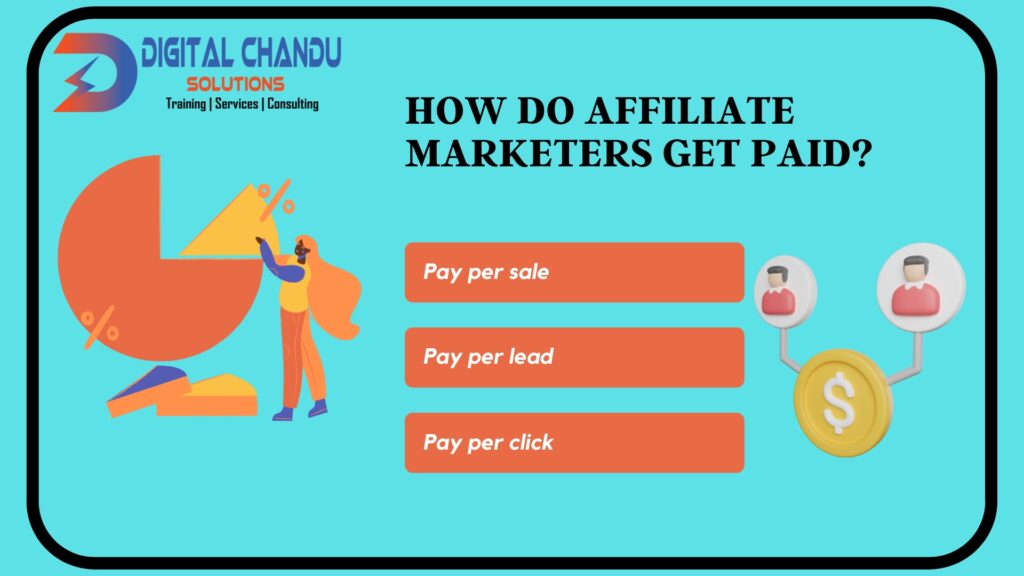What is Affiliate Marketing ? A Beginner’s Roadmap to Success
What is Affiliate Marketing ?
Affiliate marketing is a performance-based marketing strategy where a business rewards one or more affiliates for each visitor or customer brought by the affiliate’s marketing efforts. This model involves three main parties:
- The seller or product creator
- The affiliate (also known as the publisher)
- The consumer

How Affiliate Marketing Works
Affiliate marketing works through a simple yet effective process:
Joining an Affiliate Program: An affiliate signs up for a seller’s affiliate program to promote their products or services.
Promoting the Product: The affiliate uses various channels such as blogs, social media, or websites to promote the seller’s products. They share a unique affiliate link to track the traffic and sales coming from their efforts.
Earning Commissions: When a consumer clicks on the affiliate link and makes a purchase, the affiliate earns a commission from the sale.
3 Types of Affiliate Marketing
Unattached Affiliate Marketing: Affiliates have no connection to the product or service they’re promoting. They advertise to drive traffic and earn commissions.
Related Affiliate Marketing: Affiliates promote products or services related to their niche or industry but don’t use the product themselves. Their promotion is based on their authority or expertise in the niche.
Involved Affiliate Marketing: Affiliates promote products or services they have used and believe in. This approach is based on personal experiences and recommendations.
Pros and Cons of Affiliate Marketing
Pros:
Low Startup Costs: Starting affiliate marketing requires minimal investment.
Passive Income: Once your marketing strategy is set, you can earn money while you sleep.
Flexibility: Affiliates can choose their products, schedules, and working styles.
Cons:
Dependency on Merchant Rules: Affiliates must adhere to the merchant’s terms and conditions.
No Control Over Competition: The market might be saturated with affiliates promoting the same product.
Variable Income: Earnings can fluctuate based on market demand and affiliate effort.
Why Be an Affiliate Marketer?

Affiliate marketing offers several attractive benefits, including the potential for a high income, the flexibility to work from anywhere, and the opportunity to be your boss while promoting products you are passionate about.
How Do Affiliate Marketers Make Money?
Affiliates earn money through various commission structures:
Pay-per-Sale: The most common model where affiliates earn a percentage of the sale price when the purchase is completed.

Pay-per-Click: Affiliates are paid based on the number of visitors they direct to the merchant’s website.
Pay-per-Lead: Affiliates earn based on the number of leads or signups they generate for the merchant.
How to Start Affiliate Marketing in 4 Steps
Choose Your Niche: Select a niche that interests you and has a viable market.
Find Affiliate Programs to Join: Look for programs with a good commission structure in your niche.
Create Quality Content: Build a website or blog where you can create content that attracts and engages your target audience.
Promote Your Affiliate Products: Use various digital marketing strategies to promote your affiliate links.
Tips for Affiliate Marketing Success
Understand Your Audience: Tailor your content to meet the needs and interests of your audience.
Be Trustworthy: Only promote products you believe in to build trust with your audience.
Monitor Performance: Use analytics to track your performance and adjust your strategies accordingly.
Stay Updated: Keep abreast of the latest trends in affiliate marketing and your niche.
How to Join as an Affiliate at Amazon
Joining the Amazon Affiliate Program, officially known as Amazon Associates, is a straightforward process that can help you monetize your website or blog by earning commissions on referred sales to Amazon. Here’s a detailed, step-by-step guide on how to join Amazon Associates:

Step 1: Visit the Amazon Associates Homepage
Start by going to the Amazon Associates homepage. You can find it by searching for “Amazon Associates” in your favorite search engine or by navigating directly to affiliate-program.amazon.com.
Step 2: Create Your Amazon Associates Account
Click the “Join Now for Free” or “Sign Up” button on the Amazon Associates homepage.
If you already have an Amazon account, you can use it to sign in. If you need to, create a new Amazon account by providing your name, email, and password.
Step 3: Enter Your Account Information
After signing in, you’ll be prompted to enter your account information. This includes your name, address, and phone number, which are necessary for Amazon to identify you as an affiliate and to issue payments.
Step 4: Provide Your Website or Mobile App Details
It would help to list the websites or mobile apps where you plan to promote Amazon products. Amazon requires this information to ensure your platforms comply with their policies.
Enter the URL of your website, blog, or mobile app. You can add up to 50 different sites or apps.
Step 5: Build Your Amazon Associates Profile
Create your Associates profile by entering your preferred Associates ID, which will be used to track your referrals. You can use your name or any other unique identifier.
Answer questions about your websites or apps, including what topics they cover and the types of Amazon items you intend to list. Also, select how you drive traffic to your site, how you utilize your website to generate income, and how many visitors your site receives.
Provide details about your payment and tax information. Amazon needs this to pay you any commissions you earn.
Step 6: Choose Your Payment Method
Choose how you’d like to be paid. Amazon offers several payment options, including direct deposit, Amazon.com Gift Card, or check. Note that you need to meet thresholds before you can be paid.
Step 7: Start Using Amazon Associates Central
Once your account is approved, you can start using Amazon Associates Central. This is your dashboard, where you can find your affiliate links, monitor your performance, and access a wide range of resources to help you succeed.
Step 8: Create Affiliate Links
You can create affiliate links to any Amazon product from Amazon Associates Central. Use the ‘Product Linking’ menu to search for products and create links.
You can choose from different links, including text links, image links, or text and image links. Each link will contain your unique affiliate ID to ensure you get credit for the sales you refer.
Step 9: Promote Amazon Products
Embed the affiliate links on your website, blog posts, or social media platforms. When your audience clicks on these links and makes purchases on Amazon, you earn commission fees.
Step 10: Monitor Your Performance
Regularly check your Amazon Associates dashboard to see how your links are performing. Monitor clicks, conversion rates, and earnings. Use this data to adjust your strategies for better performance.
Important Tips for Affiliate marketing
Ensure your website or app is compliant with Amazon Associates’ program policies.
Be transparent with your audience by disclosing that you earn commissions from your affiliate links, as Amazon and regulatory authorities require.
Joining the Amazon Associates program can effectively earn passive income by recommending products from one of the world’s largest online retailers. By following these steps and continuously optimizing your strategies, you can increase your chances of success in affiliate marketing with Amazon.
Affiliate marketing offers a range of benefits for both affiliates and merchants, making it a popular strategy in the digital marketing landscape. Here are some of the key benefits:
For Affiliates
Low Startup Costs: Unlike starting a business from scratch, affiliate marketing requires minimal upfront investment. Affiliates can start by leveraging existing platforms like blogs, social media, or YouTube channels.
Passive Income Potential: Once the affiliate content is created and the links are in place, it can generate income round-the-clock with minimal ongoing effort. This makes affiliate marketing an attractive option for earning passive income.
No Need to Create Products: Affiliates promote existing products or services, eliminating the complexities of product development, inventory management, and customer service.
Work from Anywhere: Affiliate marketing can be done from anywhere with an internet connection, offering flexibility and freedom for individuals who prefer remote work.
Performance-Based Earnings: Earnings in affiliate marketing are directly tied to performance. This means there’s no limit to how much one can earn, offering a high earning potential for successful affiliates.
Diverse Revenue Streams: Affiliates can promote products from multiple merchants and various niches, diversifying their income sources and reducing financial risk.
For Merchants
Cost-Effective: Merchants pay for performance, meaning they only pay commissions on sales or leads. Affiliate marketing is a cost-effective strategy with a high return on investment (ROI).
Broader Market Reach: Affiliates can help merchants reach new audiences and markets they might have yet to access, increasing brand visibility and sales potential.
SEO Benefits: Affiliate links from reputable sites can boost a merchant’s search engine ranking by creating more inbound links to their website.
Enhanced Credibility: Products promoted by trusted affiliates benefit from their endorsement, strengthening the brand’s credibility and consumer trust.
Scalable Marketing Efforts: Affiliate marketing allows merchants to scale their marketing efforts without a corresponding increase in marketing staff or effort, leveraging the networks of numerous affiliates.
Data Insights: Affiliate programs provide valuable data on customer preferences, conversion rates, and marketing effectiveness, helping merchants optimize their sales strategies.
Mutual Benefits
Low Risk: Affiliate marketing presents a low-risk model for affiliates and merchants. Affiliates can switch products if one doesn’t perform well, and merchants pay only for successful conversions.
Flexibility: Both parties can test and optimize various aspects of their campaigns, such as commission structures, promotional strategies, and product offerings, to maximize effectiveness.
Networking Opportunities: Affiliate marketing fosters relationships between affiliates and merchants, opening doors to new partnerships, collaborations, and growth opportunities.
Easy Tracking and Analytics: Modern affiliate marketing platforms offer sophisticated tracking and analytics, enabling affiliates and merchants to monitor performance, track commissions, and understand consumer behavior in real time.
What are best affiliate programs
Affiliate marketing’s versatility and efficiency make it an appealing strategy for individuals and businesses looking to monetize their content or expand their market reach with minimal risk and investment.
The best affiliate programs across various industries:
1. Amazon Associates
Industry: General (Retail)
Commission Rate: Varies by category, generally between 1% and 10%
Why It’s Great: Amazon is a retail giant with a vast product range, making it easy to find relevant products to promote for any niche. A trusted brand can lead to higher conversion rates.
2. ClickBank
Industry: Digital Products and Software
Commission Rate: Can be up to 75% for some products
Why It’s Great: It specializes in digital products and offers high commission rates. ClickBank is ideal for affiliates promoting e-books, courses, and software.
3. Commission Junction (CJ) Affiliate
Industry: General
Commission Rate: Varies by the merchant
Why It’s Great: CJ Affiliate offers access to thousands of merchants, including many well-known brands. Its platform provides robust tracking and reporting tools.
4. ShareASale
Industry: General
Commission Rate: Varies by the merchant
Why It’s Great: Known for its ease of use, ShareASale hosts various merchants, making it easy for affiliates to find a good match for their niche.
5. Shopify Affiliate Program
Industry: E-commerce Platform
Commission Rate: Averages around $58 for each user who signs up for a paid plan and up to $2,000 for each Shopify Plus referral
Why It’s Great: Shopify is a leading e-commerce platform, and its affiliate program offers significant earnings for referring new merchants.
6. Rakuten Advertising
Industry: General
Commission Rate: Varies by the merchant
Why It’s Great: Rakuten is a global affiliate marketing network offering access to hundreds of top brands and products across various categories.
7. Bluehost Affiliate Program
Industry: Web Hosting
Commission Rate: $65 per sale, with opportunities for higher rates based on performance
Why It’s Great: Bluehost is a well-known web hosting service, and its affiliate program is popular among tech and blogging niches due to the essential nature of web hosting for websites.
8. Adobe Affiliate Program
Industry: Software
Commission Rate: 85% on the first month’s subscription to Creative Cloud & Document Cloud and $72 on Acrobat Pro DC
Why It’s Great: Adobe’s suite of products is widely used in creative industries, making it a lucrative option for affiliates targeting creative professionals.
9. NordVPN Affiliate Program
Industry: VPN Services
Commission Rate: 40% for new signups, 30% for renewals
Why It’s Great: With increasing concerns about internet privacy and security, VPN services like NordVPN are in high demand, offering affiliates a timely and relevant product to promote.
10. Semrush Affiliate Program
Industry: SEO and Digital Marketing Tools
Commission Rate: Up to $200 for every new subscription
Why It’s Great: Semrush is a powerful tool for SEO and digital marketing, making it appealing for affiliates targeting businesses and marketers looking to improve their online presence.
When choosing an affiliate program, consider the relevance to your audience, the commission structure, and the program’s reputation. Always read the terms and conditions carefully to understand the program’s rules and your obligations as an affiliate.
What are best products for affiliate marketing
Selecting the best products for affiliate marketing depends on your niche, audience interests, and the overall market demand. However, specific categories consistently perform well across various audiences due to their universal appeal, high demand, or recurring need. Here’s a list of some of the best product categories to consider for affiliate marketing, along with reasons why they’re effective:
1. Tech Gadgets and Consumer Electronics
Why They’re Great: There’s always a demand for the latest gadgets and electronics. Reviews, comparisons, and tutorials can attract a tech-savvy audience.
2. Software and SaaS Products
Why They’re Great: High commission rates and the growing reliance on digital tools for businesses and individuals alike. This category includes productivity tools, design software, marketing platforms, and more.
3. Online Courses and Educational Materials
Why They’re Great: With the rise of e-learning, promoting online courses and educational platforms can be lucrative, especially if they align with your audience’s interests or professional needs.
4. Health and Wellness Products
Why They’re Great: Health is a perennial topic of interest. This category can range from supplements and fitness equipment to wellness apps and meal plans.
5. Beauty and Personal Care
Why They’re Great: Beauty and skincare products have a broad appeal, and enthusiasts always look for reviews and recommendations. This category includes makeup, skincare, haircare, and grooming products.
6. Fashion and Apparel
Why They’re Great: Fashion is a dynamic and ever-changing industry with a broad audience. Affiliates can focus on specific niches like sustainable fashion, activewear, or accessories.
7. Home and Garden
Why They’re Great: Products for home improvement, decor, gardening, and DIY projects cater to a broad audience, especially as more people look to enhance their living spaces.
8. Financial Services and Products
Why They’re Great: Financial products like credit cards, investment tools, and insurance policies offer significant commission rates. However, they require a good understanding of the financial industry.
9. Subscription Boxes and Services
Why They’re Great: Subscription services provide recurring revenue. They span various interests and hobbies, from gourmet foods and wines to books and geek culture.
10. Travel Services and Accessories
Why They’re Great: Although travel can be seasonal, it offers high commission rates. This category includes booking services, travel gear, and experiences.
Selecting Products: Key Considerations
Audience Relevance: Choose products that resonate with your audience’s interests and needs.
Market Demand: Focus on products with steady or growing demand.
Commission Structure: Look for affiliate programs offering attractive commission rates and terms.
Product Quality: Promoting high-quality products enhances credibility and leads to better conversion rates.
Content Opportunities: Select products that allow you to create engaging and informative content around them, such as reviews, tutorials, or use-case scenarios.
When choosing products to promote, you must conduct market research and stay updated on industry trends to ensure you’re offering valuable and timely recommendations to your audience.
Is affiliate marketing right for me?
Determining whether affiliate marketing is proper involves assessing your interests, skills, and goals. Here’s a checklist to help you decide:
1. Are you interested in digital marketing?
Affiliate marketing is a branch of digital marketing. I am interested in learning about and applying digital marketing strategies that will help you succeed.
2. Do you have or are willing to create a platform?
Successful affiliate marketers typically have a platform—such as a blog, website, YouTube channel, or social media presence—to promote products. Are you willing to build and maintain such a platform?
3. Are you patient and persistent?
Affiliate marketing often requires time to yield significant results. It’s not a get-rich-quick scheme. Success comes with consistency, patience, and continuous learning.
4. Are you comfortable with self-learning and staying updated?
The digital marketing landscape, including affiliate marketing, evolves rapidly. Being proactive about learning and staying updated on trends is crucial.
5. Can you create quality content?
Content creation is at the heart of affiliate marketing. High-quality content attracts and retains an audience, whether writing blog posts, creating videos, or crafting engaging social media posts.
6. Are you prepared to invest time and possibly money?
While affiliate marketing can be started with minimal investment, some costs, such as website hosting, content creation tools, or paid advertising, may be involved. Moreover, it requires a time investment, especially in the beginning.
7. Do you have good analytical skills?
Analyzing performance data to understand what works and what doesn’t is critical in optimizing your affiliate marketing efforts and increasing your earnings.
8. Are you ethical and transparent?
Trustworthiness is vital in affiliate marketing. Being transparent about your affiliate relationships and promoting products ethically will build your audience’s trust and respect.
Considerations Before Starting:
Niche Selection: Choose a niche you’re passionate about with a market demand.
Product Selection: Ensure you promote products or services you believe in that provide value to your audience.
Learning Curve: Be prepared for a learning curve. Successful affiliate marketing requires understanding SEO, content marketing, and other digital marketing strategies.
Compliance: Understand the legal requirements, such as disclosing affiliate links, to comply with regulations like the FTC in the United States.
Affiliate marketing might be a good fit for you if you find yourself nodding to these points. However, you can still do it if you need more confidence in some areas. It simply means you have places to grow into. Affiliate marketing can be rewarding, offering financial benefits and the satisfaction of creating successful content strategies.
Featuring Digital Chandu Solutions
Digital Chandu Solutions offers comprehensive digital marketing training and services, including specialized courses in affiliate marketing. Whether you’re a beginner looking to understand the basics or an experienced marketer seeking to refine your skills, Digital Chandu Solutions provides expert guidance and support to help you achieve your affiliate marketing goals.
FAQ’S
Q: How much can I earn from affiliate marketing?
A: Earnings vary widely based on your niche, marketing efforts, and the affiliate programs you join.
Q: Do I need a website for affiliate marketing?
A: While a website benefits affiliate marketing, you can use social media platforms, email marketing, and other digital channels.
Q: Can I join multiple affiliate programs?
A: Affiliates can join multiple programs to diversify their income streams.
More
Digital Marketing Full Course What is SEO
What is Digital Marketing What is SMM

